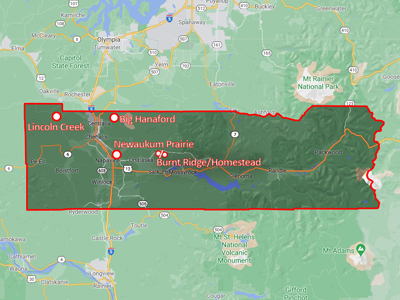The Washington Department of Ecology finalized an agreed order with Fire Mountain Farms, Inc., to apply biosolids at five sites in Lewis County.
The decision means Fire Mountain Farms may begin staging and land applying Class B biosolids to its Big Hanaford, Homestead, and Lincoln Creek sites as soon as this spring. In order to begin land application to the remaining two locations, Burnt Ridge and Newaukum Prairie, the company must meet additional requirements to complete cleanup at the two sites to deal with a mixed material that had been classified as hazardous waste before applying any biosolids.
The agreed order gives the company authorization for this specific work. This agreed order will end when Fire Mountain Farms obtains final approval under the next statewide general permit for biosolids management.
The public has 30 days to appeal Ecology’s decision to the state’s Pollution Control Hearings Board.
What are biosolids?
Biosolids is organic matter left over after domestic or municipal sewage is digested by bacteria at wastewater treatment plants and septage management facilities.
Washington law requires biosolids be put to a beneficial use, such as improving soil quality and growing crops like wheat, corn, grass, hay, and hops. Biosolids can be applied as a liquid, dewatered so the material resembles soil, or dried out completely. Ecology regulates wastewater treatment plants that produce biosolids and businesses that apply them.
Biosolids are divided into one of two classes, based on their treatment. Class A biosolids eliminate all pathogens, including viruses. Class B biosolids may include pathogens, which is why restrictions are in place that allow time for remaining pathogens to degrade before humans or animals are allowed to come in contact with them.
Cleanup activity at two sites will not be affected by permit approval
While cleanup activities at the Big Hanaford location are complete, portions of the Newaukum Prairie and Burnt Ridge sites are still going through cleanup and closure activities related to the mixed material formerly classified as a hazardous waste being improperly stored at the locations.
Last year, the U.S. Environmental Protection Agency determined that the mixed material could be delisted and disposed in an ordinary, municipal landfill. That cleanup work is nearly complete.


